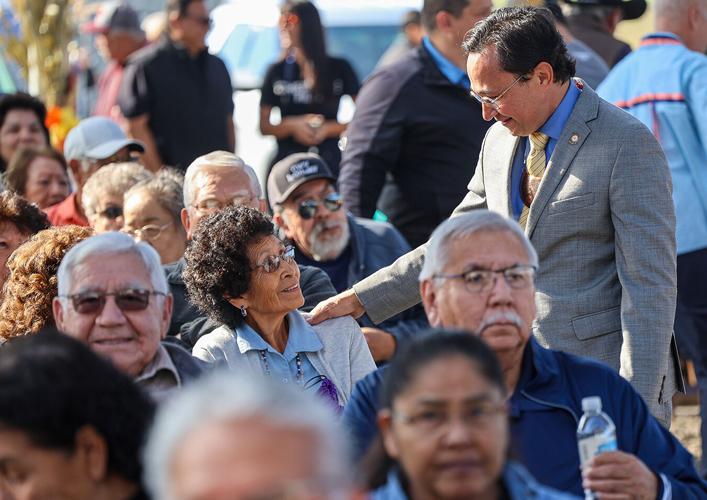
- Details
- By Chuck Hoskin Jr
Guest Opinion. Four years ago, the Durbin Feeling Language Preservation Act launched Cherokee Nation on a historic journey to preserving and perpetuating the Cherokee language. Language has always been essential to our culture as Cherokee people, as it serves as the unbroken chain connecting us to our ancestors. We cannot afford to let that chain ever be severed.
Recently, we hosted a gathering of first-language and fluent Cherokee speakers, the first of what will be an annual event going forward. At this gathering, we announced a permanent renewal of the Durbin Feeling Act, which means secure funding of at least $18 million every year for language programs to grow and evolve.
To be sure, our journey to ensure the language continues to be used daily across Cherokee Nation transcends annual budgets and administrations. The Durbin Feeling Act emphasizes that saving our language and culture is a collective responsibility. From fluent speakers to new language learners, we all have an important role.
Since 2019, we have taken significant steps forward. The budget expansion – from $5.6 million to $18 million – enabled us to more than double our full-time language workforce and double the number of Cherokee citizens participating in language programs.
Now, to ensure our language preservation efforts remain effective, we are implementing a dynamic approach. We have asked Cherokee Nation Language Department leadership to propose yearly budget increases, guided by strategic goals, program effectiveness and measurable outcomes. We envision doubling annual spending over the next seven years, demonstrating our unwavering commitment to this mission.

Greater investments in our youth are essential for this vision for the future. Deputy Chief Bryan Warner and I have proposed the construction of a $30 million Cherokee Nation Immersion Middle School in Tahlequah. Enrollment at Cherokee Nation’s two elementary immersion programs has surged by over 36%, to a total of 126 students. It’s a perfect time to build on this momentum by extending immersion in Cherokee language through the middle grades.
One of our most impactful initiatives, Speaker Services, has touched the lives of nearly 600 fluent speakers. This program has improved the quality of life for many elders, ensuring they receive critical home repairs, modern home appliances and home replacements when needed. It exemplifies our respect and support for fluent speakers, the backbone to all efforts in this preservation effort.
The Durbin Feeling Act has also focused on accessibility and relevance. That is why we are leveraging arts and new technology to generate language content and reach thousands of online students worldwide. Additionally, we have launched more community outreach efforts to bring in-person language classes to Cherokee communities across the reservation. The number of community and online language students has also seen substantial growth, respectively reaching 850 and approximately 6,000 per year.
Our mission to revitalize our language and culture depends on the collective effort of every Cherokee Nation citizen across our reservation and around the globe. Going forward, we must ask ourselves if this mission is worth our best effort, and the resounding answer must be, “Yes, we can.” Together, we stand united in our dedication to the Cherokee language, ensuring that its legacy thrives for generations to come.
Chuck Hoskin, Jr. is the principal chief of the Cherokee Nation.
More Stories Like This
Tribes Seek Better Data, Real Accountability in MMIP Cases Ahead of Tribal ConsultationWhat Would Dr. King Say About ICE?
In Unity and Commitment
Protecting Our People through Human Trafficking Awareness
It is Time for Animal Behavior to Become Its Own Discipline
Help us defend tribal sovereignty.
At Native News Online, our mission is rooted in telling the stories that strengthen sovereignty and uplift Indigenous voices — not just at year’s end, but every single day.
Because of your generosity last year, we were able to keep our reporters on the ground in tribal communities, at national gatherings and in the halls of Congress — covering the issues that matter most to Indian Country: sovereignty, culture, education, health and economic opportunity.
That support sustained us through a tough year in 2025. Now, as we look to the year ahead, we need your help right now to ensure warrior journalism remains strong — reporting that defends tribal sovereignty, amplifies Native truth, and holds power accountable.
 The stakes couldn't be higher. Your support keeps Native voices heard, Native stories told and Native sovereignty defended.
The stakes couldn't be higher. Your support keeps Native voices heard, Native stories told and Native sovereignty defended.
Stand with Warrior Journalism today.
Levi Rickert (Potawatomi), Editor & Publisher

